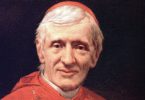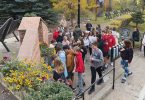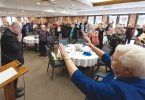by Judith Sudilovsky
JERUSALEM (CNS) — The new apostolic administrator of the Latin Patriarchate, Archbishop Pierbattista Pizzaballa, said he would focus on listening to the priests and people of the diocese to better understand the pastoral issues.
In a Sept. 21 news conference before his official entrance into Jerusalem, Archbishop Pizzaballa told journalists the diocese faces many challenges similar to those of the church in other parts of the world, including divisions within family life and young people’s disenchantment with the church. But he said the local church also is concerned with problems affected by the Middle East political situation, such as the influx of refugees, foreign workers and migrants in Jordan and Israel, many of whom are Christian, as well as issues of family reunification and an acute shortage of housing.
“The church is very much involved with the problem of refugees in Jordan,” said the archbishop, who served as Franciscan custos of the Holy Land for 12 years prior to his appointment as administrator by Pope Francis.
He also said there is a need for an administrative reorganization of the patriarchate, with new checks and balances, which is one of the reasons an apostolic administrator was appointed rather than a new patriarch at this time.
Archbishop Pizzaballa said he saw Christian unity and religious dialogue as a priority, something he also emphasized as the custos, who was responsible for maintaining the Status Quo agreement with other Christian churches.
“We don’t dialogue among us, and I would like to bring a fruitful dialogue among Christians. I want to continue to deepen this dialogue with other churches. Despite our differences, we have one face,” he said. “This is the demand of our people.”
He said Christians in other parts of the Middle East — such as Iraq, where almost half the Christian population has left the country, and Syria, where many Christians have also left — are facing a dramatic situation.
“The balances in the Middle East are changing, and the weaker population, like the Christians in Syria, is paying a high price. Here the situation is calmer, though that doesn’t mean it is quiet, but we are not facing executions like the Syrians are,” said Archbishop Pizzaballa.
He said religious leaders have to be proponents of dialogue, not only among themselves, but also in the political arena.
“We have to find the solutions together; there are no magic solutions,” he said. “We have to find better solutions. This is a long-term project of the church.”
More than a hundred Christian Palestinians, religious and foreigners, waving small Vatican flags and accompanied by a Christian Scouts marching band, came out to greet Archbishop Pizzaballa. They clapped as he entered the Old City in a procession on his way to the Latin Patriarchate for a prayer service of welcome.
Having known Archbishop Pizzaballa as the custos, people described him as a “straight and honest” man.
“This is really a moment of grace for us,” said Ilham Marshi, 55.
Sylvia Amer, who had her four youngest children in tow, said she especially wanted her children to see and remember the event.
“This is very important for us as Palestinian Christians in the Holy Land. It is an important event to remind people that this is the Holy Land; this is where Jesus was; this is where it all happened,” she said.






